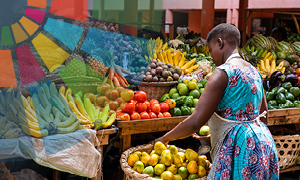According to the OECD’s recently released 2021 Agricultural Policy Monitoring and Evaluation Report, the governments of 54 countries (including all OECD members and the European Union as a whole, plus key emerging economies) provided transfers to agriculture of around $720 billion per year during 2018-2020. The report notes that “Overall, most current support policies are not serving the wider needs of food systems.”
That spending could be redirected to finance food systems transformation—helping to reduce carbon footprints while boosting resilience, improving food and nutrition security, and enhancing poverty reduction and equity. Such restructuring or repurposing of support to the agricultural sector is one of the proposed game-changing solutions for the UN Food Systems Summit (UNFSS), and was the topic of a UNFSS Science Days official side event sponsored by IFPRI, the Indian Council for International Economic Research (ICRIER) and the Academy of Global Food Economics and Policy, China Agricultural University.
Presenting the OECD report, Jonathan Brooks, Head of the Agricultural and Resource Policies Division in the Trade and Agriculture Directorate at the OECD, noted that restructuring support for agriculture would be quite helpful for addressing the challenges facing food systems. “Sustainable productivity growth is needed to feed the growing population without degrading the environment,” he said.
Rob Vos, Director of IFPRI’s Makets, Trade, and Institutions Division, reviewed IFPRI research analyzing the potential restructuring of agricultural support to both mitigate greenhouse gas emissions and enhance agricultural productivity. Simply removing distorting agricultural support is not sufficient for improving environmental outcomes, he said, but shifting current resources towards spending on R&D and farmer compensation—to make up for lost subsidies and the upfront costs of adopting more sustainable technologies and practices—could incentivize investing in emissions-reducing agricultural productivity growth. .
In a discussion, Marie Ruel, Director of IPFRI’s Poverty, Health, and Nutrition Division, and Lee Ann Jackson, Head of the OECD Agro-food Trade and Markets division, further explored the benefits and challenges to repurposing agricultural support policies, focusing on nutrition, and trade and farmer livelihoods respectively. Ashok Gulati, Infosys Chair Professor for Agriculture at ICRIER, noted that India is one of the few of the 54 countries that actually transfers resources away from farmers. Shenggen Fan, Dean of the Academy of Global Food Economics and Policy at China Agricultural University and CGIAR System Board Member wrapped up with the key findings and recommendations emerging from the event:
Food systems face new challenges that require rapid, significant transformation of existing policies
- There is a great need for better data and deeper analysis and propositions on transforming food systems.
- Marginal improvements are not enough. A food systems approach must be embraced by actors from different sectors (agriculture, health, nutrition, trade, environment, etc.) who acknowledge synergies and tradeoffs and propose a package of policy options that can achieve all goals together.
Global and national level coordination mechanisms and coalitions are required
- Efforts must be harmonized across different sectors and those who benefit from food systems transformation must find ways to compensate “losers” to move the transition forward.
- In the absence of food system ministries, better coordination among policymakers involved with different aspects of food systems will result in improved synergies and investments and help to manage political economy considerations.
Current agricultural support policies do not address the “triple challenge” facing food systems
- Reforms are needed to stimulate sustainable productivity growth and resilience, including phasing out price interventions and other distorting producer support; targeting income support to farm households in need; and reorienting public expenditures toward investments in public goods.
Repurposing of existing support is not a panacea, but an important piece of the puzzle
- Efficiency gains are key, as smart repurposing of subsidies will help achieve important societal gains, including reducing poverty and carbon emissions and improving diets.
- Nutritious diets are critically important, and repurposing subsidies to support (not subsidize) production and consumption of nutritious foods is urgent. Additionally, national dietary guidelines should take both nutritional and environmental health into account.
- Research and development should be well-targeted, and requires complementary efforts such as better infrastructure, education, and food value chain integration, among others.
- Considering that farmers in Africa south of the Sahara currently receive limited to no support, broader policy efforts to transform food systems are vital to their well-being.
Trade is critical in optimizing food production globally to minimize carbon emissions and environmental footprints
We must aim for more inclusive trade, including a focus at the next round of WTO agricultural negotiations on nutritional and environmental health.
This post has been updated.







